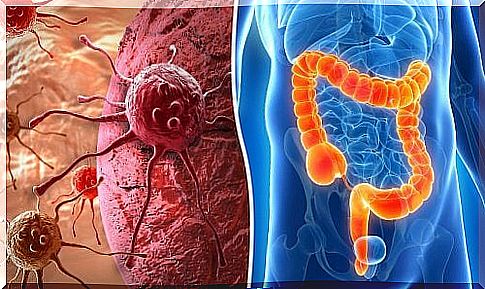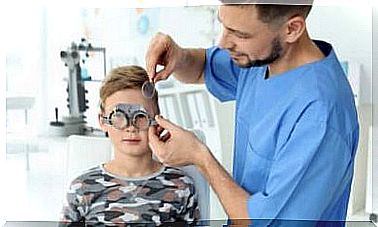How To Detect Symptoms Of Colon Cancer?
Although the symptoms of colorectal cancer can be confused with other less serious conditions, if more than one is noticed at the same time, it is best to see a doctor for an early diagnosis.

Colon cancer or colorectal cancer is found in the large intestine, the end of which is called the colon or rectum. This type of cancer may not show any symptoms in its initial stages.
It is therefore important to know them well and to take tests regularly if there is a risk of suffering from them because of genetic predispositions.
In this article, we’ll tell you how to spot colon cancer symptoms, so that you can treat them as early as possible.
Why know the symptoms of colon cancer?
In some countries, colorectal cancer is one of the leading causes of death. However, cure rates are high as long as a correct diagnosis is made on time.
Early diagnosis and treatment is vital, as this type of cancer tends to develop as benign polyps.
Risk factors
There are certain factors that increase the risk of suffering from this disease, and which we must take into account, both to prevent and to carry out the tests necessary for the detection of this type of cancer.
- Be over 60 years old.
- Suffer from colorectal polyps.
- Suffer from chronic intestinal disturbances, such as Crohn’s disease or ulcerative colitis.
- Poor diet, which contains a lot of red meat as well as harmful fats that are poor in whole foods.
- Tobacco and alcohol.
- Diabetes.
- Physical inactivity
- Overweight.
Symptoms
- Changes in evacuation habits. Suddenly, the person may start to have diarrhea or constipation for no apparent reason and without having changed their diet. The size and shape of the stool can also change.
To take this symptom into account, it must be visible for several days, without there being any improvement.
- The feeling of having a urge to defecate that does not go away after using the toilet.
- Blood in the rectum area or in the stool (which is often dark).
Over time, this symptom can lead to anemia, which can also be an important indicator. - Pain in the abdominal area, in the form of colic.
- Fragility and exhaustion without any concrete effort.
- Weight loss for no apparent reason.
- Personal or family history.
How to do ?
Before you get alarmed, you should know that all of these symptoms can also be due to other less important health problems. It is therefore essential to consult a doctor as soon as possible, but without being afraid.
We must also pay attention to any intestinal disorder, if we have relatives who have suffered from colorectal cancer, or if we ourselves have already suffered from cancer.
Preventive nutrition
We recommend that you follow simple tips that will help reduce your risk of developing colon cancer and many other diseases.
Indeed, a bowel that does not function optimally will end up causing chronic or degenerative diseases.
Fiber is essential for preventing intestinal problems.
Decades ago, foods were eaten unrefined and even though they were considered poor and simple products, they were still much healthier than today’s processed products.
Fiber is responsible for helping clean the intestine to prevent a buildup of toxins, which then pass into the blood.
This is why it is essential to increase your consumption of foods rich in fiber, such as:
- Fruits and vegetables: when they are organic, it is better to eat the skin, which is rich in fiber.
- Whole grains
- Dry vegetables
- Dried fruits and seeds
- The mushrooms
- The seaweeds
- Psyllium
- Spirulina
It is also important to know that if you increase your fiber intake, you will also need to drink more water outside of meals (at least a liter and a half per day).
In addition, during the first days, it is possible to notice a slight transient constipation.
Preventive supplements
There are natural supplements that reduce the risk of suffering from colon and rectal cancer:
- Calcium.
- Vitamin D: essential to properly assimilate calcium.
- Folic acid or vitamin B9.
- Magnesium.
- Selenium.
Supplements should be taken under medical supervision, especially if you have a medical condition or are already taking medication.









